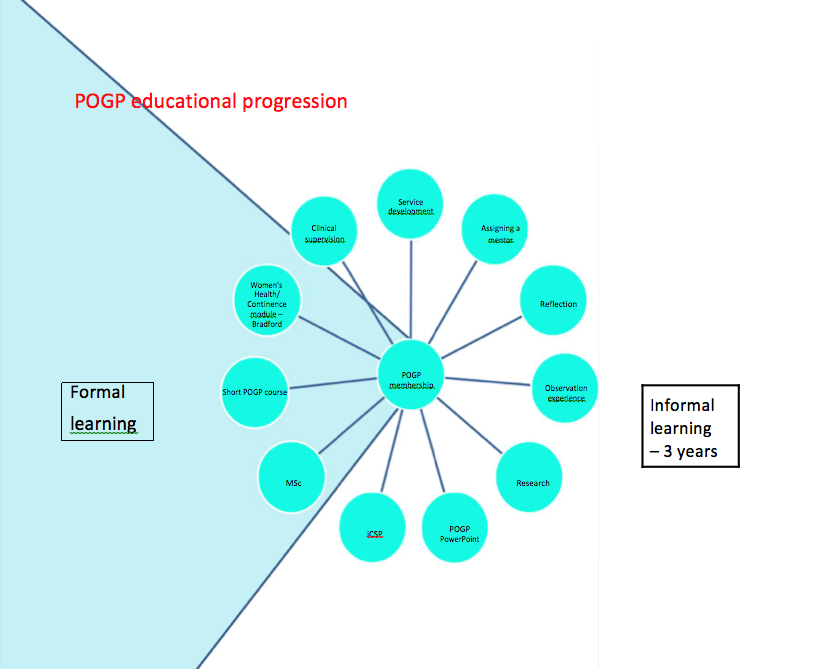Career Progression
Welcome!
Pelvic Health Physiotherapists work in both the NHS and Private Health sectors. It is an area of physiotherapy where you will apply all of the areas of your knowledge from your undergraduate degree such as musculoskeletal physiotherapy, neurology and combining this with the obstetrics and gynaecology, colorectal and urology areas of medicine.
You will work closely with your patients/clients, aiming to understand their most personal concerns about their body. It is an area where you will need to ask challenging questions in an open way to obtain virtual information to create an appropriate treatment plan. Being able to develop this enhanced therapeutic relationship with patients is why many physiotherapists choose this career path.
You will need to develop new skills in examination, understanding how to assess the abdomen, vagina and anorectal area. This will mean you will need to develop excellent skills in consent, trust and infection control procedures. The student who is keen to explore anatomy, utilise their hands on assessment skills will be keen to learn how to do this.
There are increasingly more career and learning opportunities in the field of pelvic health, and POGP want to encourage and nurture career and learning progression and potential. Below we signpost some areas POGP can facilitate in career progression in the ever growing and exciting world of pelvic health!
“It has been very satisfying over the years to see rotational staff who step into pelvic health with some trepidation for the first time, develop and shine. As an educator I enjoy teaching and supporting staff to get the best outcomes during their rotation. The greatest joy has been to see staff decide to specialise in pelvic health and become great clinicians with such passion. This is what a well supported rotation can do. Many staff simply don't get the advantage of exposure to pelvic health or are unsure what it involves. I would encourage them to find out more as it can bring something to every speciality”.
Shirley, Pelvic Health Team Lead and POGP Member
Newly Qualified and Junior Physiotherapists
Newly qualified physiotherapists can still benefit from the student rate of POGP membership of only £26 for the first two years after qualification. You are not eligible to join the searchable directory as a student member to allow time to build your skills and confidence in the area of pelvic health.
If you are new to pelvic health and are about to start on a pelvic health rotation when POGP have written a fantastic document, Introduction to Pelvic, Obstetric and Gynaecological Physiotherapy: An Educational Resource, a 29 page document outlining key information for the physiotherapist new to pelvic health.
Educational Resource Introduction to POGP
Specialising in Pelvic Health

POGP encourages those in pelvic health or those with a clinical interest to maintain affiliate membership of POGP. You may choose to do some or all of the following in order to contribute to your career development.
- Submit your details into our searchable directory
- Apply for our bursaries and awards
- Network regularly through our social media channels
- Complete research
- Submit case studies, articles or research to our POGP journal
- Join one of our sub-committee roles
- Work towards full membership, utilising the mentor support
- Complete regularly peer reviewed POGP courses
Competency Framework
This framework is intended as a reference guide providing a template for gap analysis, supporting continuous professional development throughout your career, whether in the National Health Service or private practice.
The following areas of competency are covered:
- Core clinical skills
- Obstetric procedures
- Urinary and gynaecological assessments
- Bowel health and management
- Digital vaginal and anorectal examination
This resource is designed to assist healthcare professionals in identifying areas for further development and maintaining high standards of patient care.
Physiotherapy competencies
Further links:
POGP short courses
Diary and booking page for POGP courses
Progression to full POGP membership
Membership routes to POGP
Criteria for Membership of POGP
Educational Resource Introduction to POGP
Physiotherapy competencies
Want more information?
POGP is always here for you!
A great place to look for more information is in our resources section. If you cannot find what you are looking for then you can contact us via our contact us section, by email info@thepogp.co.uk or through our Twitter and Facebook social media channels.